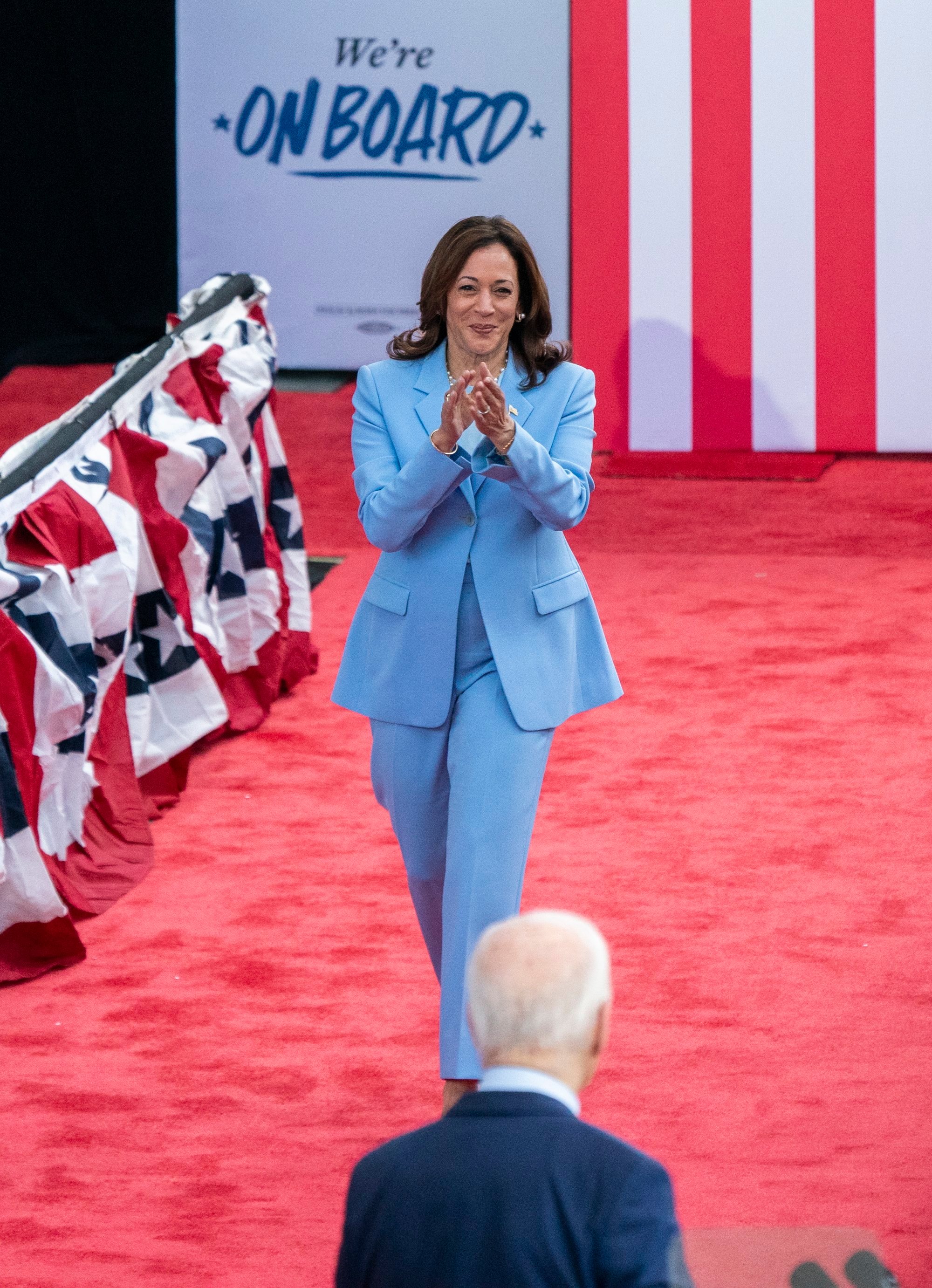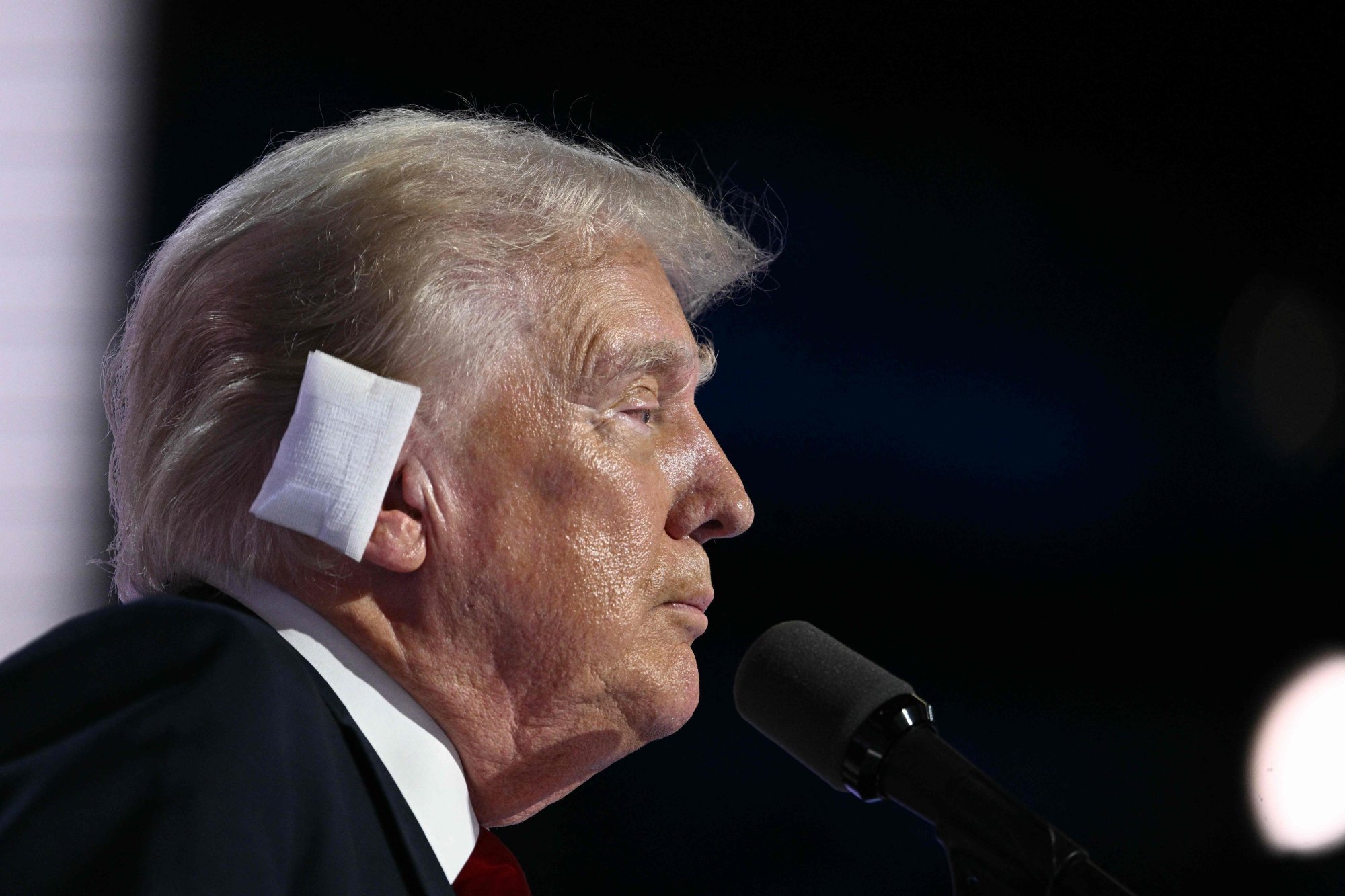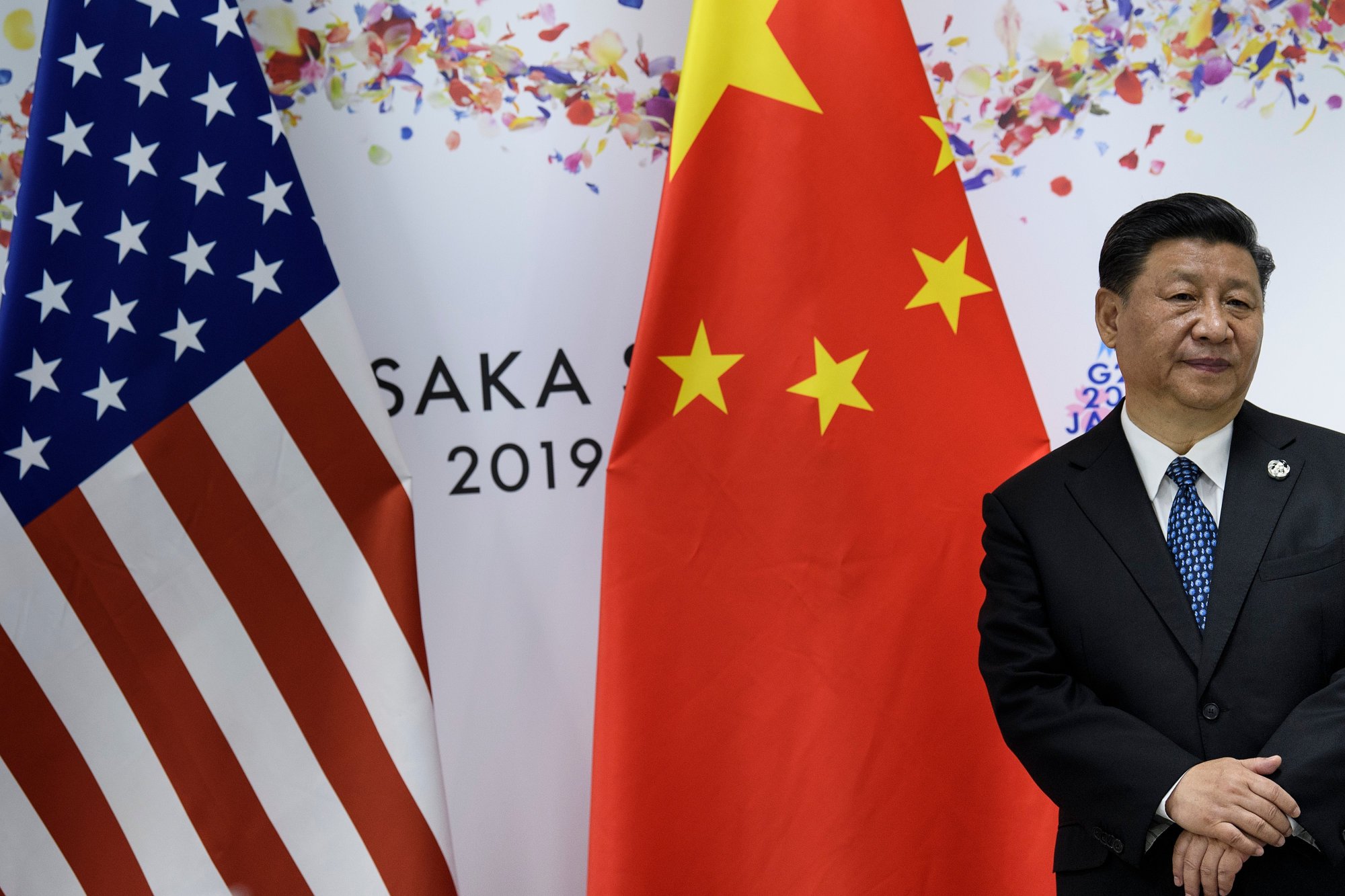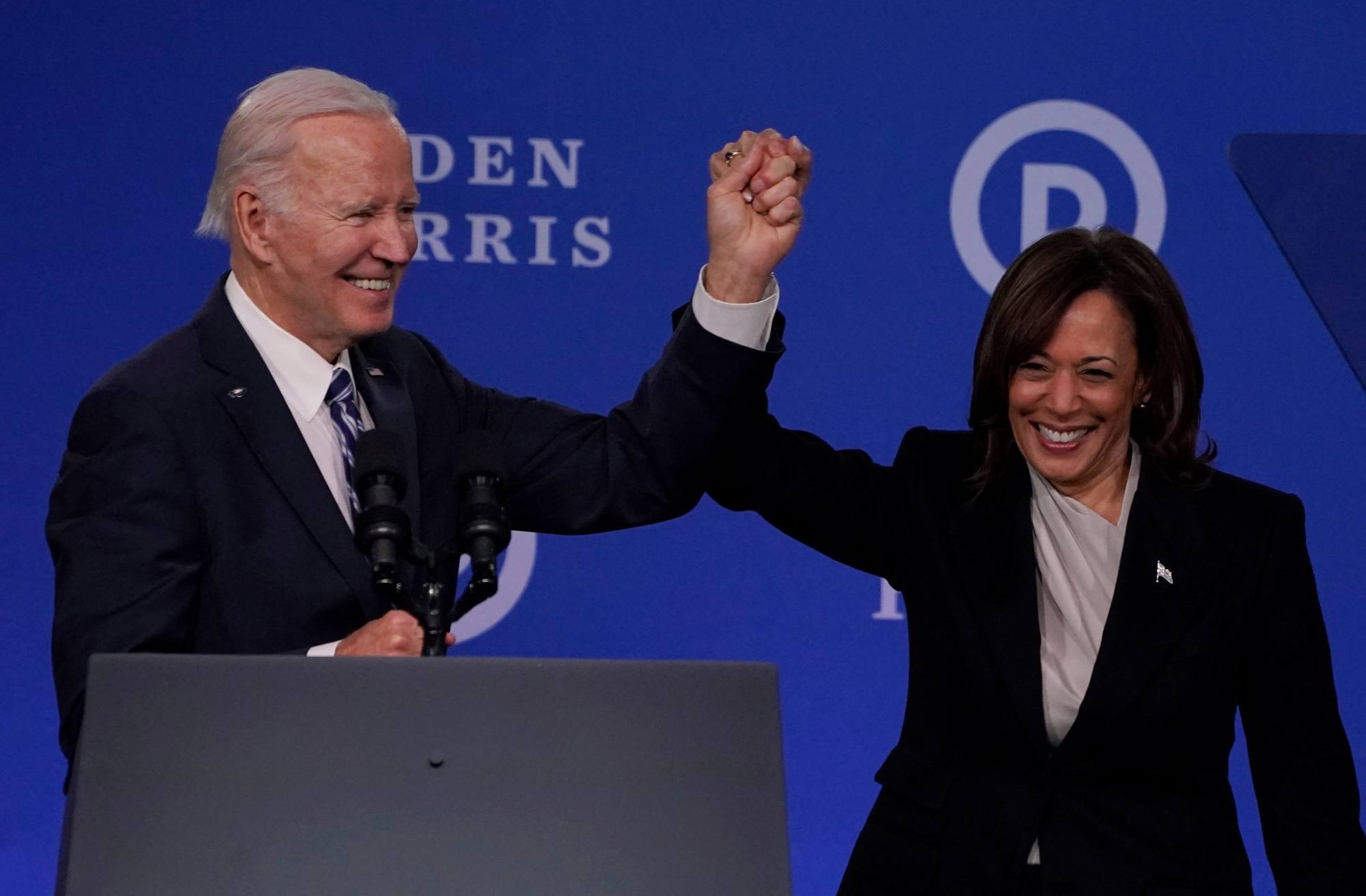Facing intense pressure from across the political spectrum, US President Joe Biden made the extraordinary move on Sunday of withdrawing as the Democratic candidate to lead the party in the November election, the president announced on X, formerly known as Twitter.
Biden, 81, gave his support for Vice-President Kamala Harris to succeed him.
His decision makes him the first elected American president since Lyndon Johnson in 1968 to opt not to seek a second term.
Do you have questions about the biggest topics and trends from around the world? Get the answers with SCMP Knowledge, our new platform of curated content with explainers, FAQs, analyses and infographics brought to you by our award-winning team.
“I believe it is in the best interest of my party and the country for me to stand down,” he said in his early afternoon message, adding a few minutes later: “I have decided not to accept the nomination and to focus all my energies on my duties as President for the remainder of my term.”
My fellow Democrats, I have decided not to accept the nomination and to focus all my energies on my duties as President for the remainder of my term. My very first decision as the party nominee in 2020 was to pick Kamala Harris as my Vice President. And it’s been the best... pic.twitter.com/x8DnvuImJV
— Joe Biden (@JoeBiden) July 21, 2024
Biden said he would speak to the nation later in the week in more detail about his decision. The political earthquake comes less than a month before the Democratic party convention.
“My very first decision as the party nominee in 2020 was to pick Kamala Harris as my Vice-President. And it’s been the best decision I’ve made,” Biden added. “Today I want to offer my full support and endorsement for Kamala to be the nominee of our party this year.
“Democrats — it’s time to come together and beat Trump. Let’s do this.”
Harris said in a statement that she was honored to have Biden’s endorsement and that she intended to “earn and win this nomination”.
The decision follows the first televised debate last month against the Republican nominee, former president Donald Trump, that the Biden campaign asked for, yet ultimately proved politically disastrous for the octogenarian.
In the weeks following the debate, Biden and his advisers went into overdrive hoping to repair the damage, with defiant statements, interviews and campaign events trying to convince donors and Democratic Party stalwarts that he was mentally sharp and physically capable.
“When you get knocked down, you get back up,” he said at a rally in North Carolina.
These included an ABC News interview with George Stephanopoulos, radio interviews involving questions pre-vetted by the White House and an hour-long Nato press conference in which he mistakenly referred to Vice-President Kamala Harris as Trump.
But ultimately the debate memes and verbal lapses, reinforced incessantly on social media, proved decisive. A bout of Covid-19 in mid-July that briefly kept Biden from actively campaigning and fed into Trump’s narrative of a frail opponent did not help.
It came a week after an attempted assassination of Trump just ahead of the Republican National Convention that prompted Biden to temporarily suspend campaigning and pull advertisements.
“There is no place in America for this kind of violence,” Biden said.
This has diverted voter attention from Trump’s shortcomings, including his own age, slower gait, verbal missteps and at times nonsensical statements.

The Republican convention in mid-July also seemed at times more like a coronation of an inevitable next president than a battle still under way, political analysts said.
That confidence was seen in Trump’s choice for vice-president, Senator J.D. Vance of Ohio, a white male who does little to appeal to female and minority voters and who has termed China the “biggest threat” to the US. Biden’s exit may require a significant Republican retooling just weeks before the election.
During the hugely consequential debate on June 27, Biden often stumbled over his responses and at one point appeared to freeze up, despite preparing for nearly a week.
Political analysts said that Biden sought to show he was still on top of his game and demonstrate his policy chops compared with Trump, who is known for his bluster and indifference to the truth.
But the president failed spectacularly in a performance seen as meandering, halting and unsettling that failed either to promote his successful handling of the economy, his positions on abortion and foreign affairs or to fact-check Trump’s multiple misstatements.
Public calls by Democratic elected officials for Biden to step down started a few days after the debate with a statement by Representative Lloyd Doggett of Texas.
“Recognising that, unlike Trump, President Biden’s first commitment has always been to our country, not himself, I am hopeful that he will make the painful and difficult decision to withdraw. I respectfully call on him to do so,” Doggett said.
— Joe Biden (@JoeBiden) July 21, 2024
In subsequent days, the drumbeat intensified, with Representative Nancy Pelosi of California, the influential former House speaker, hinting that Biden should reconsider his declaration to stay in the race, saying that “time is running short” for him to decide.
This was followed a few days later by more blunt comments by Representative Adam Schiff of California, another Democratic heavyweight and close Pelosi ally, calling directly for Biden to step aside. By July 17, some three dozen elected Democrats had made their “best to leave” views explicit.
Polls shortly after the debate showed momentum only slightly shifting in Trump’s favour in key battleground states and nationwide.
But the continued questioning of Biden’s capabilities accelerated the trend, with recent surveys suggesting that two-thirds of Democrat voters supported his stepping down even as major campaign donors signalled their discontent.

The turmoil within the party has also fuelled questions about voter enthusiasm, amid concern that tepid Biden supporters would be less likely to vote or might choose Trump or an independent candidate.
It was not immediately clear whether Democrats will unite behind Harris.
California Governor Gavin Newsom endorsed Harris to lead the Democratic ticket, which removed from the running someone who had been seen as a logical replacement for Biden, and a strong contender.
Some lawmakers in the party’s progressive wing, including Washington’s Representative Pramila Jayapal and New Hampshire’s Representative Annie Kuster quickly expressed their support.
However, while lauding Biden’s decision, former president Barack Obama said the Democratic Party will be “navigating uncharted waters in the days ahead” and that it will be up to party leaders “to create a process from which an outstanding nominee emerges”.
Meanwhile, Vance, House Speaker Mike Johnson, and more than a dozen other Republican lawmakers are calling for Biden to step down, arguing that the president’s decision to not finish his reelection campaign means that he is not fit to undertake his official duties.
The last time such a late decision was made not to run was over a half-century ago when Johnson shocked the nation with his televised announcement in March 1968.
Amid strong criticism of his escalation of the Vietnam war and nationwide campus unrest, Johnson faced primary challenges from Senators Robert Kennedy of New York and Eugene McCarthy of Minnesota.
But Johnson made his announcement when party primaries were still going on, and Johnson’s vice-president, Hubert Humphrey, had time to step in. After Kennedy was assassinated in June 1968, Humphrey won the nomination at a chaotic convention in Chicago only to lose a close election to the Republican nominee, Richard Nixon.
In Biden’s case, he faced only token challenges during this year’s primaries and secured the necessary number of delegates for the nomination early in the process.
Now uncertainty surrounds Biden’s successor , as it is not immediately clear how to transfer campaign funds and delegate votes earmarked for Biden to a new candidate.
The new Democratic presidential candidate will also have a relatively short period to build public support before the November 5 election, in a US presidential election process that can seem interminable.

Analysts said the US is in uncharted territory. Several potential Democratic candidates have done marginally better than Biden in recent polling. But Harris enjoys stronger name recognition, and would seem to offer her party the easiest transition in advance of the November 5 showdown.
“But that could change,” said Charles Franklin, director of the Marquette Law School Poll. “We woke up this morning with one race and now we’re in a very different race.”
Franklin noted that Chinese President Xi Jinping has joined a line of foreign leaders and diplomats reaching out to Trump. This is rational national self-interest as they hedge their bets for any next US leader, he added.
“It will be seen as a troubling transition, but given the growing consensus that Biden would lose to Trump, the world is probably slightly more relieved than they were this morning,” Franklin said. “But they’re not taking anything for granted. They have to deal with the hand they’re given.
Also unclear is how this will affect US China policy.
Biden campaigned on a pledge to revisit the China policies championed by Trump, whose early admiration for President Xi Jinping’s authoritarianism gave way to an unprecedented trade war targeting mainland goods and practices.
Upon succeeding Trump in 2021, Biden kept the tariffs in place and added to them, focusing on hi-tech sectors under a “small-yard, high-wall” strategy.
And during his three-plus years in the Oval Office, Biden has amassed arguably one of the most substantial legislative records among modern American presidents.
His achievements have included passage of the US$1.9 trillion American Rescue Plan, the Inflation Reduction Act targeting investments in renewable energy and healthcare, the Infrastructure Investment and Jobs Act as well as the Chips and Science Act.
That said, Biden has won relatively little credit in the eyes of an American public weary of inflation, illegal immigration and other issues.
Harris for years has weathered criticism that she was not up to the job of being a heartbeat away from the presidency. But she now finds in pole position as the Democrats’ best hope to stop Trump’s comeback.

While Harris, 59, ticked several boxes in an increasingly diverse United States as the first woman, Black and South Asian vice-president in US history, she has long struggled with approval ratings as weak or weaker than Biden’s.
But Biden gave her very difficult portfolios to manage, including the hugely controversial immigration assignment that supporters say gave her little early chance to shine.
The last 12 months, however, have seen her gain more confidence and more stature, advocating aggressively for abortion rights -- a Trump weakness -- and reaching out to suburban women, younger voters and Black men.
If she does gain the Democratic nomination she will face in Trump a rival known for name calling, personal insults and unfair characterisations. The Trump campaign is already planning attack advertisements against Harris, according to news reports.
Elements of the Trump campaign’s attack strategy were on display within minutes of the news.
In a phone call to CNN Trump said of Biden: “He goes down as the single worst president by far in the history of our country,” adding that he thought Harris would be easier to defeat than Biden would have been.
But Harris’s experience as a prosecutor and ability to forcefully argue policy in ways that a faltering Biden fell short on could fundamentally change the campaign.
She has also won plaudits in party circles by staying loyal to the 81-year-old president during the last few weeks, even as other wannabe Democratic candidates circled and as she quietly prepared for his potential pull-out.
More from South China Morning Post:
- Kamala Harris, a trailblazer eyeing America’s last glass ceiling
- As Donald Trump’s election odds grow, US allies in Europe and Asia reassess China strategy
- Barack Obama tells allies Joe Biden needs to reconsider his re-election bid, US reports say
- What 4 things could make Joe Biden drop out of the White House race?
- Two-thirds of Democrats want Biden to withdraw from US presidential election, poll finds
For the latest news from the South China Morning Post download our mobile app. Copyright 2024.





